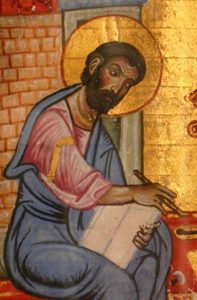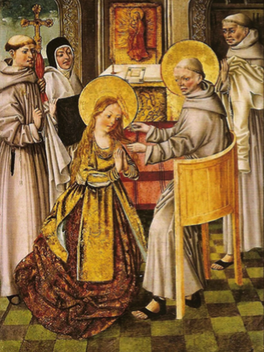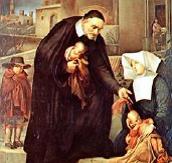
Saint Luke’s theology of stewardship is well-documented. But it is also well-known that an understanding of Saint Mark’s theology of Christian discipleship in the second Gospel is necessary in order to understand Luke’s views on stewardship. Hence, Mark’s views on discipleship as well as his stewardship of Saint Peter’s memories, make him an important stewardship saint in his own right.
According to the Acts of the Apostles, Mark’s mother, Mary, owned a house in Jerusalem in which the earliest Christian community gathered. After visiting Jerusalem, Paul and Barnabas took Mark back with them to Antioch. Mark assisted them in their evangelization efforts in Cyprus, but upon their arrival by ship in Perga, he left them and returned to Jerusalem. Later, after returning to Antioch, Paul and Barnabas had an argument over Mark. Barnabas wanted to take Mark on their next missionary journey, but Paul objected on the grounds that Mark had not persevered on the previous journey. Accordingly, Barnabas took Mark back to Cyprus, and Paul set out for Syria and Cilicia with Silas.
In the letter to Philemon, Mark is mentioned among Paul’s fellow workers. When Paul was held captive in Rome, Mark was with him, giving him “comfort” (Col.4:10). In the same verse, Mark is mentioned as the cousin of Barnabas, and the Christians at Colossae are urged to offer hospitality to Mark if he should come there. Elsewhere, Timothy is asked to bring Mark to Paul, since he is useful for the apostle’s ministry. The first letter attributed to Peter, written in all likelihood from Rome, mentions Mark as the “son” of Peter, a term either of simple affection or an indication that Peter was Mark’s father in the faith. Mark’s presence in Rome with Peter would be consistent with the tradition that Mark was the steward of Peter’s memories, taking copious notes of Peter’s reflections on Jesus’ teaching and deeds. This tradition comes from the early Christian historian Eusebius, who also wrote that Mark was Peter’s “interpreter.” Many scholars believe that Mark wrote his Gospel while in Rome, although another tradition suggests that the Gospel was written in Alexandria.
Saint Mark is the patron saint of many groups including lawyers, notaries, secretaries, painters, pharmacists and interpreters. He is also the patron saint of Venice and Egypt. His traditional symbol is that of the winged lion and his feast day is April 25.



